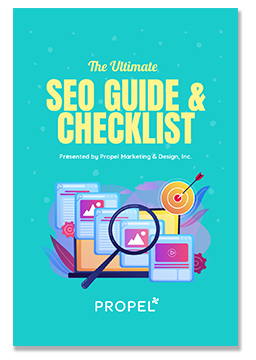ROI stands for return on investment. It’s a calculation based on the amount of money you put into something compared to the amount of money that something produces for you.
When a business invests in a business-related item or project, they’re doing so under the assumption that they will get a larger return than the amount spent on said item or project.
So, is putting money and time into your SEO (search engine optimization) campaign worth the investment?
We say yes.
Actually, to be more accurate, we say heck YES it is!
The ROI of SEO can mean the make or break of your business, so you’ve got to do it right.
Today we’re talking about why deciding to invest in SEO is the smart choice and how to easily measure your SEO ROI.
Why Invest in SEO
Every business wants to make a significant ROI with the things it spends its budget on, whether that’s on hiring, offline marketing, overhead, digital marketing, or any of the other thousands of things you can spend money on when running a business.
We’re here to tell you that we get it, we appreciate your confusion, but you can rest assured that SEO should 100% be part of your budget.
Why?
Because the world is online, and that means you need to be found there. Your competition is taking your business if you’re not.
We talk a lot about SEO on our blog, and if there’s one thing we want to drive home, it’s that when SEO is done right, it will:
- Drive more traffic to your website
- Get more people through the doors of your local business
- Lead to more conversions
- Generate more sales and leads
- Get your brand more recognition
- Connect you with your ideal clients / customers
- And of course, move you up the world-famous Google ladder
Wondering how you know if your SEO is truly gaining traction? There have been several SEO tools created that can help measure your SEO success efficiently and accurately.
Wondering who should run your SEO campaign?
You have three options:
- You and the before-mentioned SEO tools work together
- You use one of your in-house team members
- You hire an outside agency
If you have the bandwidth to take SEO on yourself or if you have an in-house team member who can do it (excellent!), you’re still using your or your employee’s time, energy, and resources, so this is still considered an investment.
So… How Do You Calculate the ROI of Your SEO Campaign?
Knowing for sure that the SEO investment is a smart move will give you the peace of mind you want to continue managing your much-needed SEO campaign.
There are several tools that provide metrics that allow you to see your opportunity for sales through things like:
- Your visitor count
- Conversion rates
- Ranking on Google
This is of benefit but won’t give you hard numbers.
Sites are set up either as eCommerce (sales made directly from the site) or lead generation (no sales on the site, but the site is used to generate a sale offline). Google Analytics will help with both.
For eCommerce sites
For eCommerce sites, use Google Analytics to track your conversion rate, and you can see the revenue being pulled in from your website. You can review various reports to get insight into your ROI, and you can segment by channel, focusing on Organic Traffic. Organic Traffic is your main metric of focus that provides your SEO results.
For lead generation sites
For lead generation sites, set up your Goal Values in Google Analytics so you can make an educated guess as to how well your SEO is working. So, if the action you want the user to take is to fill out a contact form, assign a monetary value to every contact form submission. How? Take the general lifetime value of your custom (LTV) and multiply that by the close rate (the percentage of leads that turn to customers).
Example: $15,000 (LTV) x 15% (close rate)= $2250 (Goal Value)
Then start tracking by segmenting your Organic Traffic.
To ensure you’re tracking the customers who are buying, review the following:
SEO-Assisted Conversions
This identifies users who found you through an organic (unpaid) search but moved on to other conversion interactions after.
SEO Last Click (Direct) Conversions
This identifies users who only used organic search and purchased from your website in the initial session.
Metrics Worth a Mention
Besides reviewing your organic traffic metrics, here are a few others that will help you get the ROI your want with your SEO:
- Where are you showing up on Google (the search engine results pages)? Ensure you come up under the correct searches/queries.
- Keyword ranking tells you where your site ranks with its keywords and related keywords.
- Page speed is essential to the user experience and will lead to a bounce (page leave) if loading takes too long.
- Having a high domain authority means you’re trusted to the higher, the better!
The Long-Game of SEO
SEO is necessary because it’s consistent. Once you get it going, it’s hard to lose your momentum, which means it can truly set you up for longevity. Unlike with paid ads or social media buzz, SEO will stand the test of time, which is why it’s such a solid investment.
On the flip side, you must understand that SEO is a long-game win. It’s not something that happens overnight or with minimal steps. Put the time and effort in now, so the reward pays off for years to come.
Focus on:
- Keyword research
- Target audience
- Link building
- Optimized content (including videos and images)
- Blogging
- Social media presence
- Testimonials and reviews (including your response)
- User experience
- Calls to action
SEO and content work in unison and your successful SEO campaign contributes to your overall digital marketing campaign.
Next Steps
We know it’s a tall order, but we see great results daily. If you’re overwhelmed or need some guidance, we’d love to help. Our team at Propel knows the ins and outs of getting your SEO campaign the ROI that packs a punch. Schedule a call with us today, and let’s get your business more business.




![How to Write a Professional Chiropractic Bio [Template Included]](https://propelyourcompany.com/wp-content/uploads/write-a-bio-500x383.jpg)

